- Home
- Yvonne Navarro
Hellboy Page 3
Hellboy Read online
Page 3
Whitman, his face flushed and dripping, hobbled over to where they stood, his head jerking every time he thought he saw something move overhead. “What are you two talking about?” he demanded.
Matlin’s mouth twisted. “A red ape.”
Broom scowled at the photographer as the gunfire died abruptly—the soldiers had lost track of their prey. “It’s not an ape—” He broke off suddenly, straining to hear above the ringing of his own ears. Was that breathing he was hearing?
“There,” Matlin said suddenly. He pointed at the blackness between side-by-side statues of a gargoyle and a saint. In the overhead space, something moved slightly. “It’s got a big stone in its hand.”
The professor shook his head and strained to see, then took a cautious step forward. “I think that is its hand.” Another step, and the creature hissed at him.
The sergeant thrust his jaw out and aimed his rifle upward, but Broom reached out a hand and pushed the barrel down. “Wait.”
In the pause that followed, the waiting men saw…
Eyes.
Bright golden, veined with streaks of burnt sienna, and set in a face colored crimson, they stared from the shadows and waited.
It was just a hunch, but Broom thought it was worth a try. Moving slowly so he didn’t spook it, he stepped a little closer, then fished a battered Baby Ruth candy bar out of his jacket pocket. The candy was smashed and gooey, but he was betting it wouldn’t make a difference. Peeling back the wrapper, Broom waved the candy bar back and forth. Too fast—the creature shrank back, afraid.
Broom waited for a few moments, then brought the candy bar up to his mouth and took a bite. He chewed, making as much noise as possible, smacking his lips. The little golden eyes appeared again, blinking curiously, trying to see. Broom extended his hand and offered the candy bar again.
A moment’s hesitation, then a small, red face pushed its way out of the darkness, followed immediately by a right arm. The arm was the same color as its face except it was, incredibly, made of solid stone. Tiny runes were engraved around its thick, round wrist, and four perfectly articulated stone fingers wiggled and reached for the chocolate. Except for the stone hand, the creature looked like a miniature version of one of the demon statues scattered around the chapel, all the way from the curving horns protruding from its head to the long tail that trailed from its small, muscular body.
“Jesus,” said one of the young soldiers in amazement. “Would ya look at the size of that whammer!”
Broom ignored him and moved a little closer, holding out the candy bar as bait. The creature peeked nervously at the other men staring at it, but when Broom looked at it and reached upward—
The little red demon slid down from the statue and climbed into his arms.
Broom remembered seeing a thin blanket in the med pack. Still holding the creature, he walked over and plucked it from the ground, then draped it over the back of the thing he was holding. From beneath the blanket, the stubby little red fingers snatched the candy out of his hand.
Broom grinned and looked at the stunned faces of Whitman, Matlin, and the other men. “It’s a boy,” he announced. He actually sounded proud. “Just a baby boy.”
With their curiosity overcoming their fear, the soldiers clustered around to see it, gradually losing their jumpiness as they realized it wasn’t going to bite or attack. Always ready to take advantage of a good opportunity, Matlin quickly began directing them until he had what he wanted: a group shot, with Broom holding the demon baby like a proud new father and patting his back.
Broom smiled at the little red creature held snug in his arms. He didn’t know if it understood him, but it blinked its bright golden eyes trustingly and twitched its tail like a big, happy cat.
“Best photo of my career,” Matlin said dreamily. The red bulb was still lit over the doorway, and he liked the way it bathed the room in red, bringing back the busier days of his photography career as well as reinforcing the memories he was recounting. “And no one has ever seen it since,” he added. There was no disguising the disappointment in his voice. “They keep saying he’s not real, but I want to set the record straight before I go.”
On one of the work counters was an old portfolio. The leather was cracked from use, battered by years of being out in the weather of a hundred different assignments and countries. He’d never considered replacing it—the portfolio was like the lucky underwear that the star pitcher has to wear to the play-offs or else. Matlin pulled it over and unzipped it, fighting with the sticky, heavy-duty zipper to get it to let go. When he finally got it open, the photographer pulled an old eight-by-ten from the pile of pictures inside. He smiled at the next batch of memories unfolding in his mind.
“Here,” he said, holding it up. “The real picture, not the retouched one that appeared in Life magazine.” His finger was shaking as he pointed to it. “This is him. The very same night we found him—the night Broom gave him that name.” Matlin hesitated. “Can I say it on TV?
“He called him Hellboy.”
3
SIXTY YEARS LATER
SITTING ON AN EXTREMELY UNCOMFORTABLE CHAIR ON the wide stage, Tom Manning told himself for the tenth time that he was on national television, he would not lose patience, nor would he insult the over-made-up host of this so-called television talk show. From his position, Manning couldn’t see much beyond the lights focused at him and the host; megawattage spotlights that were so bright he was vaguely surprised that the people who had to stare into them day after day didn’t go blind—it was like looking into a dozen suns all at the same time. He’d always loved being on television, but these things were hot; he’d gotten out his best Armani suit for this fiasco, and all he’d ended up feeling like was a bacon-wrapped hot dog under a broiler.
The show’s host gave him a bright, plasticized smile that was obviously phony, then gestured for Manning to turn and look over his shoulder. When he did so, a screen behind them flashed to bright life. A cascade of tabloid covers and news clippings rolled across it, all, of course, artfully arranged for the best—i.e., most shocking—effect:
“Hellboy Sighting in Reno! Government Denial!”
And another one, complete with color footage of a fistfight in progress, that Manning decided on the spot would be his personal, secret favorite:
“Jerry Springer’s Next Show: I Was Hellboy’s Bride!”
Manning started to turn back to the audience, but the host impatiently motioned for him to keep watching. He glanced back just in time to see a line of grainy footage depicting a blurred image that was supposedly Hellboy crossing an alley. To Manning, it was nothing but a ludicrous modern-day imitation of Big-foot in the woods.
Unable to keep quiet any longer, Manning pointed to the screen. “Look at that,” he said in mock disgust. “That’s a costume! These people amaze me.” He ran a careful hand over his tinted black hair before continuing, hoping his bald spot didn’t show through under all these overly bright lights. “With their conveniently blurry footage of their beloved ‘Hellboy.’ And they claim that he works for the FBI?” He snorted.
The host gave him another overly toothy smile. It reminded Manning of a shark outfitted with fake chompers, circling a seal from below and looking for the perfect angle of attack. “Mr. Manning,” he said in a butter-smooth voice, “as the head of the Special Operations Division at the FBI, you’ve seen dozens of pictures like this!”
Manning nodded, then leaned forward, going for the sincerity perspective. “Exactly!” he exclaimed. He sent a token glance toward the film footage that was frozen on the screen. “So why is it that they’re all out of focus? Come on—God knows, people manage to get good pictures at a wedding!” He pointed at yet another blurry picture being displayed on the monitor. “That’s the alleged best man?”
Amid a roomful of laughter, the delighted audience broke into applause.
BIRGAU PASS, MOLDOVA
In the Kishinev Mountains, the snow whipped along on a vicious wind, pic
king up speed as it slid down the high slopes on either side and battering the three figures struggling to climb the ice-slick steps of a massive rock formation. When the passageway narrowed to where it was barely wide enough to let them through, the wind only intensified; more than frigid, the subzero temperatures had long ago numbed what little skin was exposed on the travelers’ faces and tinged their hands and feet with the first shadows of frostbite.
They struggled on through the knee-deep snow until the shoulder-width pass finally dead-ended. With a heavily gloved hand, one of the group reached out and dug into the snow until a small section of the rocky ground was cleared. After a few seconds, a symbol chiseled into the stone emerged through the whiteness, and the figure pulled out the leather-bound book that had once belonged to Grigori Yefimovich Rasputin. Flipping through it quickly revealed a matching illustration.
In front of them was a wall of ice, rising above them until it melded into the snow swirling through the pass and made it impossible to tell where the ice ended and the mountain began. Shuddering with cold, the first figure took out a heavy steel hammer, hefted it, then swung it hard.
CRAAAAAACK!
Another hit—
CRAAAAAACK!
And a dozen more after that, and finally the cloudy wall of ice shattered and fell at their feet.
The last of the figures pulled a homespun woolen scarf aside, revealing the craggy, weatherbeaten face of an aging peasant. “I will guide you no further,” he said, managing English but with a thick Romanian accent.
The second figure, smaller than the other two, nodded and pulled something from his pocket. He offered it out to the peasant and the man grinned, showing poorly cared-for teeth; pleased, he greedily snatched his pay—two small gold ingots, each bearing a deeply engraved swastika on it—from the leather-covered palm.
Beyond the remains of the curtain of ice was a rough-walled corridor. The only light was what now spilled through the entranceway, except for something small at the far end—
A firefly.
Odd to see such a thing in these mountains and at the height of the brutal winter, but it let them know without a doubt that they were on the right path.
The first two figures moved into the stone passageway without hesitation, and after a few seconds their peasant guide reluctantly followed. Not far into it, the corridor turned right slightly, then straightened again and opened into a cathedral-like vault, easily large enough to hold a stadium. From an opening too far above to actually see, an eerie blue light streamed down, illuminating a magnificent labyrinth. Here and there, more fireflies speckled the air, their lumines-cent bodies winking on and off.
Everything in here was indescribably huge. Cyclopean statues guarded architecture that could only be called inhuman, twisting monoliths of darkly colored, carved stone. Dozens of walkways and ramparts split the space, dwarfing the humans and making them seem tiny and insignificant. They walked until they were finally at the center of the complex, where the stone floor was covered in grooves that radiated from a shallow stone basin.
The peasant guide pulled his hat off as though he feared he was standing in a hallowed place, a church, and would be accused of showing disrespect. Then he tugged at his scarf uncomfortably and glanced around. When he spoke, fear made him lapse into his native Romanian. “Noi nu ar trebui sa fim aici.”
We should not be here.
The two other people exchanged glances, then the first one withdrew another two gold pieces from a hidden pocket, tossing them at the feet of the guide. The gold surfaces glittered around the engraved swastikas.
The peasant looked from them to the two ingots thoughtfully, then glanced around the cavernous space in which they stood. Making his decision, he shrugged and knelt to scoop them up. Before his fingers could actually close around the gold—
TCHKKK!
The sharp end of a long blade burst through the front of his chest. He blinked twice and opened his mouth as though he wanted to protest, then slowly tilted forward and fell. From behind him, the second person withdrew the bloodied blade and watched impassively as the peasant twitched and died at their feet. After a moment, he tugged the layers of woolen scarves aside, revealing his signature mask. Karl Kroenen calmly cleaned his blade in the snow as the other figure shed her clothing—Ilsa, cold and lovely and not looking a day older than she had more than a half century earlier.
Sheathing the blade, Kroenen bent and retrieved the gold, then pulled the other two pieces from the dead guide’s pocket—one should not waste. Finally he used a booted foot to turn the man’s body on its back, nudging it into place so that the blood, steaming and smelling heavily of copper in the frigid air, traced a glyph in the stone grooves and quickly filled the small center basin.
A long beat later, and a ripple formed in the puddle of blood, vibrating and reshaping itself into the image of a man’s head. It began to rise, pulling itself into shape as it grew in height. Finally, it stood there, naked and haloed by the bright, shimmering fireflies.
Ilsa stared at it, then found her voice. “Your eyes…What did they do to your eyes?”
In the darkened X-ray lab, four white-coated doctors studied the line of X-rays clipped to the long light box in front of them. Every now and then one of them would punch a button and split the silence in the room with the quiet whirrr of the conveyor as it moved one to the left or to the right and put a different film at center stage. Hospitals always had a certain sense of grayness about them when the overhead fluorescents were turned off, but there was no comfort in the shadows that moved in to fill the spaces abandoned by the light. The air was always a little too chilly, the quiet a little too disconcerting, the smell a little too sanitized.
Another X-ray slid forward and the group of physicians peered at it momentarily, then exchanged somber glances. The windows were covered with light-blocking miniblinds, but they could still hear the rain splattering the outside of the glass, driven by the unseasonably cold wind.
Finally the doctor on the far left cleared his throat and looked at the others. “Have you told him yet?”
The man next to him, taller and with distinguished-looking salt-and-pepper hair, didn’t answer. Instead, he glanced to the side of the light box, where he could see through a small window of one-way glass into the adjacent examining room. As he watched, Trevor Bruttenholm, now in his eighties, carefully buttoned his shirt. From his wrist dangled his ever-present rosary.
The doctor sighed and straightened the tie beneath his white lab coat, then left the others and went to join Professor Bruttenholm, or Broom, as the old man had insisted he be called. On the surface, he looked to be in good shape, up in his years but lean and fit. But anyone with a trained eye would catch the slightly sallow tint to his color, the telltale sign of loosening skin that signaled a weight loss that had happened a bit too quickly. Worse was the shakiness that showed up while doing everyday things, little things, the occasional grimace of pain, and now and then, the under-current of exhaustion clearly visible.
Broom looked up as he entered and the doctor could tell immediately that the old man had read the news on his face: He was an excellent physician, but after all these years, he still hadn’t mastered the art of completely masking his feelings when he had the worst kind of news to give to a patient, especially one he liked.
Broom didn’t say anything, just waited.
The doctor pressed his lips together tightly, then forced himself to form the words. “Malignant sarcoma. In the lungs, the spine, the liver.”
Broom looked from the doctor, then down to the tarot cards he held in his hands. Finally, he asked, “Approximately how long?”
“Maybe…six weeks.”
Broom nodded, thinking.
“I can arrange for hospitalization,” the physician offered. Saying these things was always difficult, and you never knew how the patient was going to react. He had people tell him he was wrong and to go to hell, once a woman had even thrown her purse at him. He kept going. “Pain
management to make the time more bearable.”
But Broom, always the quiet one, only shook his head as he aimlessly shuffled his deck of tarot cards. “I’d rather stay home. You know, I’ll be making arrangements.” He paused before adding, “For my son.”
The doctor nodded, then folded his hands. There were things he was obligated to say, although he knew the futility of it. “You can always get a second opinion.”
Broom slipped the top card off the deck and looked at it stoically.
Death.
“That won’t be necessary.”
Halloween in Manhattan, fall in the air. Dried leaves skittered along the pavement, slipping along the curbs and into the street, where they mingled with bits of trash and were occasionally swept into little whirlwinds. The storefronts were filled with blinking black and orange lights, strands of tiny pumpkins with bright, winking eyes that bobbed along the tops of the displays. Below the lights, pumpkin bowls and containers were painted with both friendly and scary faces and contained candy of every imaginable size and color, with candy corn always the frontrunner of the season.
Broom made his way out of the building, leaning heavily on his cane, smiling a bit as two kids dressed as skeletons and carrying little orange jack-o’-lantern candy buckets ran in front of him. Agent Lime had Broom’s limo, a black Mercedes, waiting at the curb, but Broom paused before climbing inside, then went back to a newsstand and bought a dozen Baby Ruth bars. Before he could return to the limo, his gaze was caught by a wall display of televisions in an electronics store. They were all tuned to the same station, and as Broom watched, a blurry red shape blinked onto all the screens—Hellboy.
“Son,” Broom whispered.
As he stared at the display, it changed to a smiling talk show host, some Regis Philbin knockoff with nearly the same name and dental work sitting behind a rounded oak desk. Typical daytime television—teeth too big, eyes too wide, shining hair too stiff and perfect. “Mr. Manning,” he said brightly, “what about the ‘Bureau for Paranormal Research and Defense?’ The FBI has been known to conceal—”

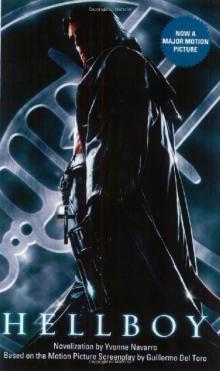 Hellboy
Hellboy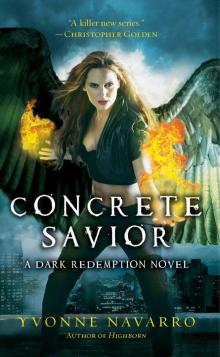 Concrete Savior
Concrete Savior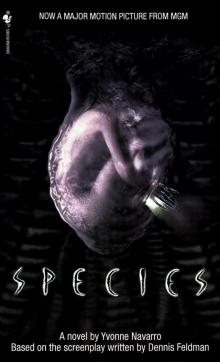 Species
Species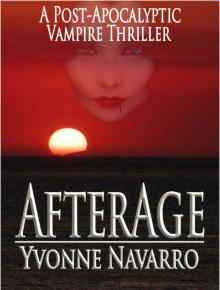 AfterAge
AfterAge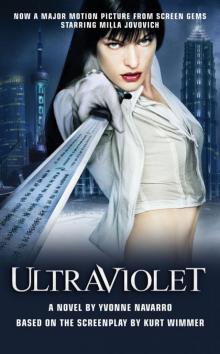 Ultraviolet
Ultraviolet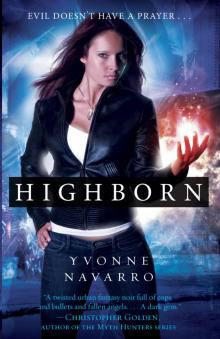 Highborn
Highborn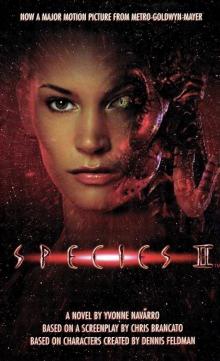 Species II
Species II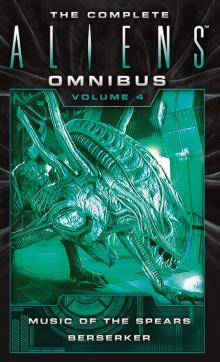 Aliens Omnibus 4
Aliens Omnibus 4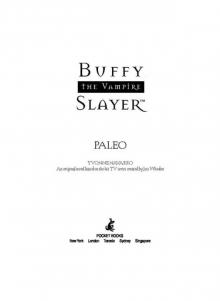 Paleo
Paleo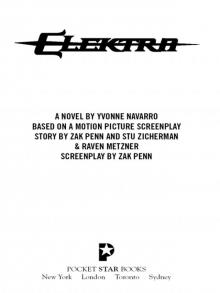 Elektra
Elektra